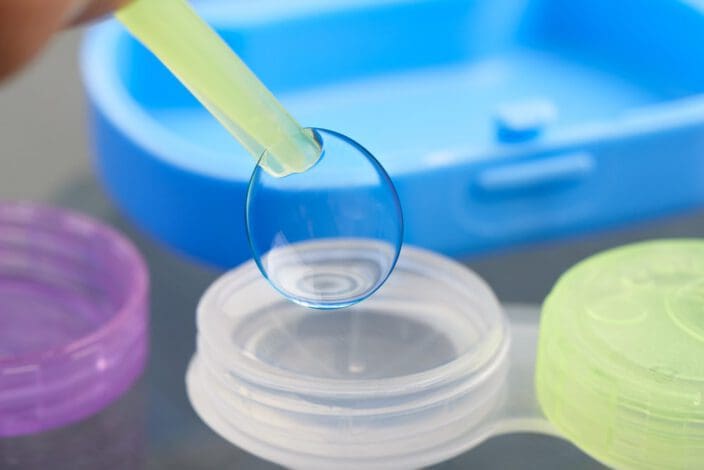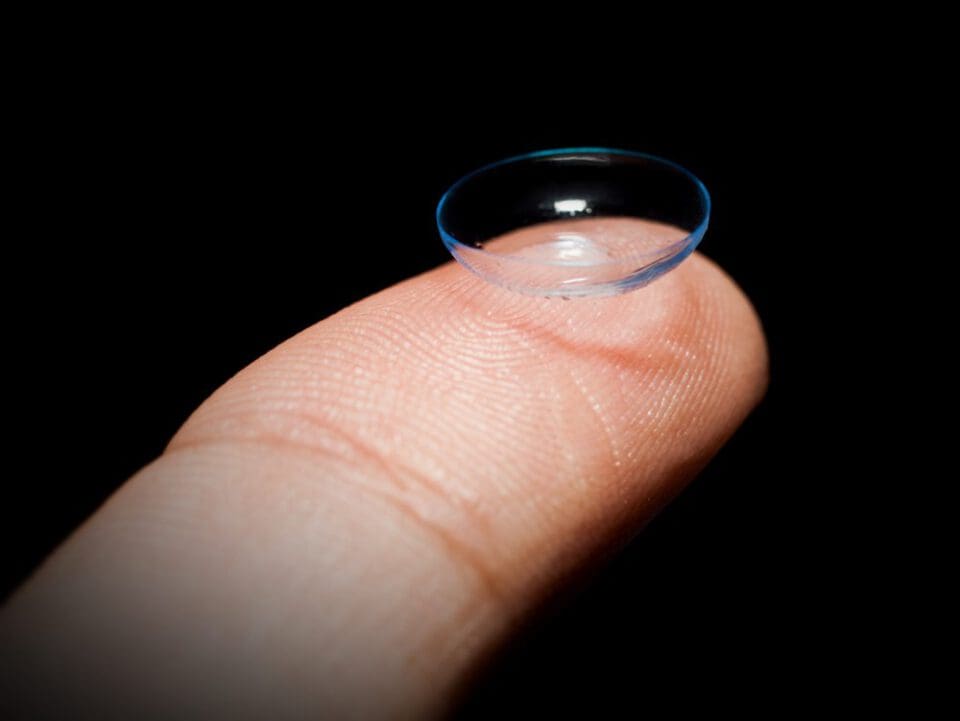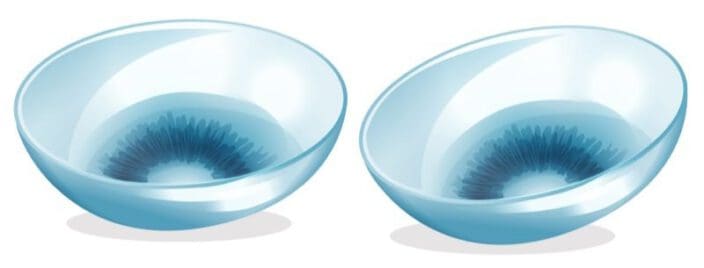Are Monthly Contacts Safe to Use for Longer?
Home / Understanding Contacts /
Last Updated:
Wearing contacts longer than their recommended length of time can increase the risk for eye infections and complications. There are many different types of contacts on the market and the traditional ones are designed for daily use. This means that they are to be taken out each night.
Table of Contents
Contacts will typically have a set disposal schedule as well. For example, daily disposable contacts are meant to be used for one day and then thrown away. Monthly contacts are generally worn during the day, cleaned and stored each night, and then disposed of after a month of daily use. There are monthly, or extended wear, contacts that can be worn continuously for up to a week or longer.
It is important to follow the guidance of your eye doctor and all instructions from the contact manufacturer on caring for your contact lenses, how long you can safely wear them, and when to replace them.

Why Not to Use Monthly Contacts Longer
Soft contact lenses are marketed both in daily use and extended wear lenses. Mayo Clinic warns that while extended wear, or monthly, contacts may be approved for continuous monthly use, they are not without complications even when worn as directed.
Wearing your contacts for an extended period of time, including when you sleep, can allow debris to build up under the lenses and potentially lead to eye infections or corneal complications. The FDA warns that wearing contacts overnight can cause stress to the cornea. Not enough oxygen will get through the lens, and this can cause corneal damage, elevating the odds for infection.
The longer you wear contact lenses continuously, the greater the risk for an eye infection. This can potentially even lead to blindness without proper treatment.
Everyone’s eyes are different. Some people are unable to wear contacts overnight, even if they are designed for weekly or monthly continuous wear.
You deserve clear vision. We can help.
With 135+ locations and over 2.5 million procedures performed, our board-certified eye surgeons deliver results you can trust.
Your journey to better vision starts here.
Complications of wearing monthly contacts longer than their disposal schedule can include:
- Hypoxia, which is a lack of enough oxygen flowing through the lens to the eye.
- Corneal problems, including ulcers, or infectious keratitis, tears, abrasions, and sores.
- Inflammation, which can become chronic and make it hard for you to continue to wear contacts at all.
- Conjunctivitis (pink eye), which is an infection in the conjunctiva that lines the eyelids.
- Eye irritation, which can distort vision along with being uncomfortable.
- Eye infection, which can be serious and cause lasting damage to the eye.
The FDA warns that many of these complications can occur with regular contact lens use, especially if strict guidelines for contact lens care are not followed exactly. Extending the wear and use of your lenses beyond their recommended time increases the potential for negative consequences.
When Am I Supposed to Replace Lenses with a New Pair?

Replacement frequency may vary by days, weeks or months.
Daily
Most daily wear lenses are disposable. You put them on during the day and remove them when you go to sleep. The following day, you wear a new pair of contacts.
Bi-Weekly
These are two-week disposable contacts, which you should take out every night. They last longer than the daily options and you should get a new pair twice a month.
Monthly Lenses
You wear monthly contacts for a full month, after which you should get a fresh pair. Like most contact lenses, you should take these out every night before going to sleep.
Getting the Most Life Out of Your Contacts
To get the best use and longest wear out of your contacts, it is important to follow all the instructions laid out by the manufacturer and your eye doctor. You can preserve the life of your contacts by using the specific solution recommended and cleaning them properly.
The FDA explains that it is important to follow these guidelines for contact lens care:
- Use only the proper lens solution.
- Avoid “topping off” the solution in your lens case and not fully replacing it.
- Wash your hands before handling your contacts.
- Use only the solution and avoid any form of water.
- Use the lens solution only for as long as recommended and replace after the “use by” date after opening.
- Change out your contact lens case every three to six months.
It is important to stick to the replacement schedule for your contacts. They may need to be replaced daily, weekly, every two weeks, monthly, or quarterly, depending on the type.
If you wear extended wear contacts, it is recommended to let your eyes have a break and breathe for at least one night before putting the next set in after you replace them.

You deserve clear vision. We can help.
With 135+ locations and over 2.5 million procedures performed, our board-certified eye surgeons deliver results you can trust.
Your journey to better vision starts here.
The Longest-Lasting Contacts on the Market
Contacts, when cared for properly and used as directed and recommended, can last up to a year in some cases. For example, some contact lenses made out of silicone hydrogel and hydrogel materials that are designed to be reusable each day may be preserved for up to a year when taken care of right. Hard contact lenses, that is rigid gas permeable (RGP) lenses, may even be able to be extended beyond a year since they are less pliable and sturdier.
Many of the contacts designed for extended wear are thinner than traditional contacts. They are made up of silicon hydrogel, which allows oxygen to pass through more easily and freely.
The following two types and brands of extended wear contacts are FDA-approved for wear up to a month, including overnight wear if your eyes can tolerate it:
- Alcon Air Optix Night & Day Aqua
- Bausch + Lomb PureVision
Typically speaking, contacts made of hard plastic materials are designed to last longer than soft contacts and disposable contact lenses. They often cost more, but they will not need to be replaced as frequently.
Frequently Asked Questions
How long can you really wear monthly contacts?
Monthly contacts are meant to be worn for 30 consecutive days, only to be removed at night. They’re best for people who experience no discomfort wearing the same pair of contacts for an extended duration.
Can you reuse monthly contacts?
You can wear the same pair of monthly contacts each day for a whole month. You should dispose them off and wear a new pair after 30 days.
What happens if you wear contacts longer than recommended?
You’ll get a daily, weekly or monthly contact lens prescription based on your lifestyle and comfort needs. Wearing your contacts beyond the prescribed duration exposes you to discomforts and side-effects, some of which may be vision-threatening. Corneal complications and eye infections can occur if you don’t replace your contacts as recommended.
You deserve clear vision. We can help.
With 135+ locations and over 2.5 million procedures performed, our board-certified eye surgeons deliver results you can trust.
Your journey to better vision starts here.
References
- Contact Lenses: What to Know Before You Buy. (March 2019). Mayo Clinic.
- Focusing on Contact Lens Safety. (September 2018). U.S. Food and Drug Administration.
- Contact Lens Risks. (September 2018). U.S. Food and Drug Administration.
- Daily Disposable Contact Lenses: Pros and Cons. (June 2018). All About Vision.
- Contact Lens Care. (January 2018). U.S. Food and Drug Administration.
- Contact Lenses: Frequently Asked Questions. (December 2018). All About Vision.
- Extended Wear Contact Lenses. (September 2016). All About Vision.
This content is for informational purposes only. It may have been reviewed by a licensed physician, but is not intended to serve as a substitute for professional medical advice. Always consult your healthcare provider with any health concerns. For more, read our Privacy Policy and Editorial Policy.
